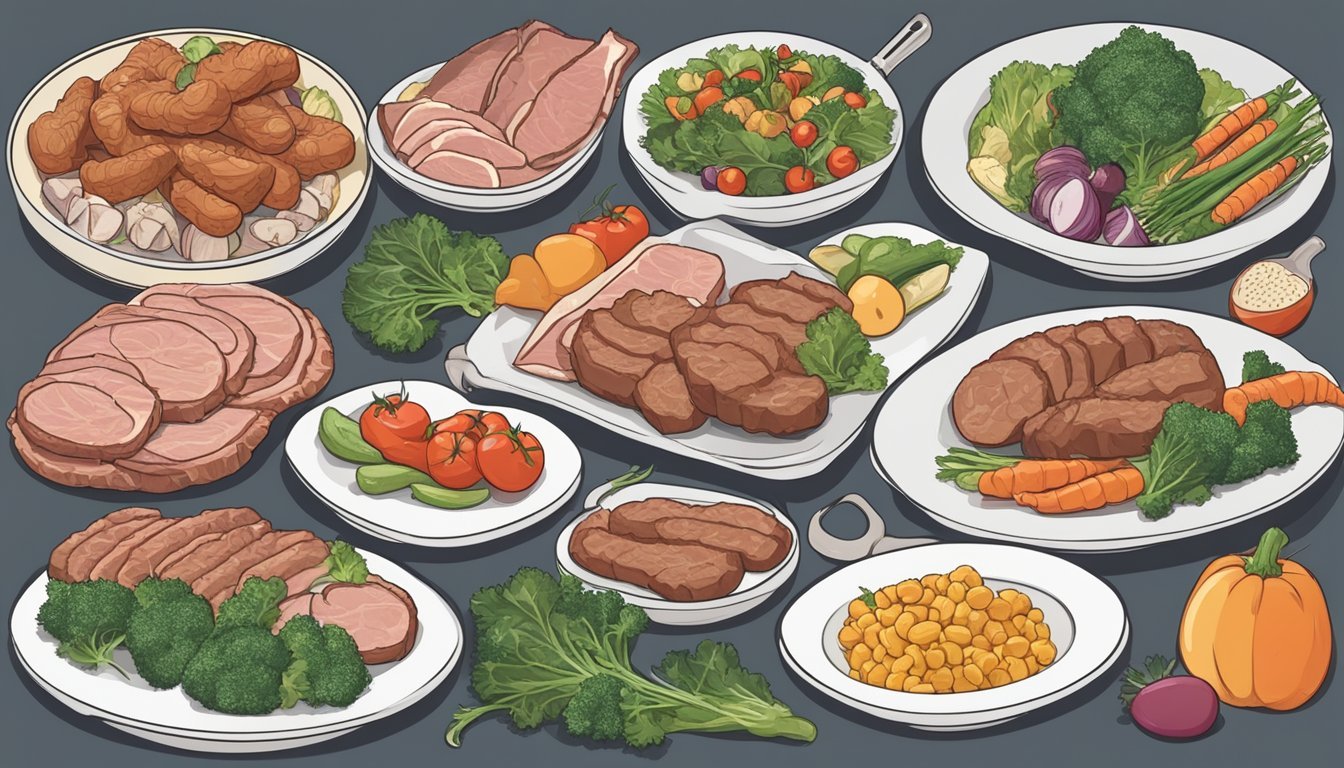Craving These Foods?
Your Body Might Be Telling You Something Important on a Carnivore Diet
Switching to a carnivore diet can be a significant change for your body, and cravings might arise as you adapt. Craving sugar could indicate your body is searching for a quick energy source due to the absence of carbohydrates, which are broken down into sugars for fuel. This can be common as your system adjusts to a zero-carb intake.
Craving dairy, like milk or cheese, might suggest a need for relaxation and stress reduction. Milk contains l-tryptophan, a compound known to enhance mood and promote better sleep. It's a natural signal from your body indicating it may benefit from substances that aid in relaxation.
Experiencing a longing for a variety of foods on a carnivore diet isn't unusual. It could signal a need for certain nutrients or just be part of the natural adaptation process. Recognizing and responding to these cravings is essential to maintaining balance and well-being while following such a restrictive nutritional plan.
Understanding Food Cravings
Food cravings can indicate various factors related to hunger, habitual behaviors, or specific nutritional needs. Recognizing these cravings, especially when adhering to a carnivore diet, is essential for managing one’s overall health and well-being.
The Role of Cravings in the Carnivore Diet
Cravings on a carnivore diet may signal deficiencies or imbalances. For instance, a craving for dairy products might highlight a need for the amino acid l-tryptophan, which is known to boost mood and aid in sleep.
Similarly, a sudden desire for something sweet could indicate a need for quick energy due to insufficient caloric intake. This diet heavily depends on meat, so monitoring such cravings is crucial.
Common Types of Cravings and Their Meanings
Sweet Cravings: These often arise when the body needs quick energy. On a carnivore diet, it can mean that one's dietary fat intake isn't high enough to sustain energy levels throughout the day. Ensuring balanced fat consumption might reduce these cravings.
Dairy Cravings: This can be related to a need for relaxation and sleep quality, linked to the presence of l-tryptophan in milk. A proper balance of amino acids in the carnivore diet can help manage such cravings better.
Salty Cravings: These cravings could indicate an imbalance in electrolytes. Given that the carnivore diet is low in carbohydrates, attention to sodium and potassium levels may prevent these types of cravings.
Understanding these cravings helps in fine-tuning one's carnivore diet to meet the body's nutritional demands.
Nutritional Deficiencies and Their Signals
Nutritional deficiencies can often manifest as specific food cravings. Understanding these signals is crucial, especially for those on a carnivore diet.
Iron and Red Meat
Iron deficiency is prevalent, especially among females of child-bearing age and young children. It can result in fatigue, dizziness, and paleness. People may crave red meat, liver, or other iron-rich foods because these foods are excellent sources of heme iron, which the body absorbs more efficiently than non-heme iron from plant sources.
Including sufficient iron in the diet helps prevent anemia. It’s essential to incorporate red meats, as well as organ meats like liver, into a carnivore diet to address and potentially prevent iron deficiency. Regular consumption of these meats can help meet daily iron requirements.
Online shopping for iron supplement is the smart choice for a seamless transaction!
Magnesium and Chocolate
Magnesium deficiency can lead to cravings for chocolate, as this food is one of the richest dietary sources of magnesium. Symptoms of magnesium deficiency include muscle cramps, irritability, and fatigue. Those on a carnivore diet might miss out on magnesium-rich plant foods.
Incorporating foods that are naturally high in magnesium into the carnivore diet, such as beef, fish, and certain organ meats, can help mitigate these cravings. Ensuring adequate magnesium intake is vital for muscle function, nerve function, and energy production.
Enjoy the convenience of doorstep delivery when you buy magnesium online!
Sodium and Salty Foods
Craving salty foods can signal a sodium deficiency. Sodium is crucial for maintaining fluid balance, nerve function, and muscle contractions. Those on a restrictive diet might inadvertently reduce their sodium intake too much, leading to symptoms like dizziness, headaches, and muscle cramps.
It's essential to monitor sodium levels and include sufficient salt in the diet. Using sources such as bone broth and salted meats can help maintain electrolyte balance and prevent deficiencies. Regularly consuming these foods ensures that the body’s sodium needs are met.
Incorporating a variety of meats and being mindful of nutrient intake can help manage and prevent nutritional deficiencies on a carnivore diet.
Impact of Hormones on Diet
Hormones play a significant role in influencing food cravings and eating habits. They can dictate when we feel hungry, full, stressed, or in need of comfort, directly impacting the success of any diet, including a carnivore diet.
Hunger Hormones: Ghrelin and Leptin
Ghrelin and leptin are key regulators of hunger and satiety. Ghrelin, known as the "hunger hormone," is produced in the stomach and signals the brain to increase appetite. On a carnivore diet, it’s crucial to recognize when ghrelin levels rise, as ignoring these signals can lead to overeating later.
Leptin, on the other hand, is released from fat cells and sends signals to the brain when it's time to stop eating. In individuals with high body fat, leptin sensitivity may decrease, causing persistent hunger despite adequate fat stores. Ensuring balanced leptin levels can help maintain satiety and prevent overeating, which is vital for adherence to a carnivore diet.
Stress and Cortisol: Craving Comfort Foods
Cortisol, commonly referred to as the "stress hormone," is released during times of stress. Elevated cortisol levels can lead to cravings for comfort foods, which are often high in sugar and fat. This can be particularly challenging on a carnivore diet, where such foods are not part of the allowed intake.
Managing stress through activities like exercise, meditation, and proper sleep is essential to keep cortisol levels balanced. When cortisol levels are controlled, cravings for non-carnivore, high-sugar foods are reduced, making it easier to stick to a carnivore diet. Moreover, maintaining a routine can help mitigate stress-induced hormonal imbalances.
Psychological Factors Influencing Diet
Psychological factors play a significant role in shaping dietary choices, especially on restrictive diets like the carnivore diet. Understanding the connection between mood, stress, and mental health can provide insight into why certain food cravings occur.
The Connection Between Mood and Food
Mood heavily influences dietary choices. Individuals often seek comfort foods high in fat, sugar, or carbohydrates to elevate their mood. Such foods trigger the release of dopamine, a neurotransmitter associated with pleasure and reward. This biochemical reaction creates a positive feedback loop that encourages repetitive consumption of these foods.
Changes in mood can result from dietary restrictions. For example, eliminating carbohydrates may initially lead to mood swings or irritability. Over time, however, some people report improved mood stability and mental clarity on the carnivore diet. This shift may be attributed to a reduction in blood sugar fluctuations and inflammation.
Diet also impacts the body's stress response. On a carnivore diet, nutrient deficiencies or imbalances might exacerbate stress levels, affecting mental health. Being mindful of how mood and diet interact can help tailor strategies to reduce cravings and improve dietary adherence.
Emotional Eating and Cravings
Emotional eating is another significant psychological factor influencing diet. Individuals often use food as a coping mechanism for stress relief or emotional distress. In these instances, cravings are typically not driven by hunger but by a desire for emotional comfort.
Stress can trigger cravings for specific types of food, often those high in fat, salt, or sugar. These cravings can undermine the strict guidelines of the carnivore diet, leading to potential deviations and guilt.
Mental health also plays a crucial role in emotional eating. Poor mental health, including conditions like depression and anxiety, increases the likelihood of turning to food for solace. Recognizing these patterns is essential for maintaining dietary integrity and developing healthier coping strategies.
Mindfulness practices and stress management techniques can help mitigate emotional eating. Identifying and addressing the underlying emotional triggers can lead to more consistent adherence to the carnivore diet and overall better mental health.
Health Conditions and Diet Preferences
Certain health conditions can significantly influence diet preferences and cravings. Understanding the correlation between specific cravings and underlying health issues can help in making informed dietary choices.
Pica and Non-Food Cravings
Pica is a condition characterized by cravings for non-food substances such as dirt, clay, or chalk. This condition can be particularly concerning as it may indicate nutritional deficiencies, particularly in minerals like iron and zinc.
Individuals with pica may experience cravings due to underlying physiological needs. Addressing these deficiencies through appropriate dietary adjustments can often alleviate the symptoms. For example, incorporating iron-rich foods like red meat, poultry, and organ meats into a diet can help manage iron deficiency, which is commonly linked to pica.
Proper medical consultation is essential to diagnose and treat pica effectively. Dietary supplements and focused nutrition can play a significant role in overcoming this condition.
Anemia and Iron-Rich Food Cravings
Anemia, a condition characterized by low levels of red blood cells or hemoglobin, often leads to cravings for iron-rich foods. This is the body's natural response to increasing iron intake, which is crucial for producing healthy red blood cells.
Symptoms of anemia include fatigue, weakness, and pale skin. Dietary choices can significantly impact the management of anemia. Foods rich in heme iron, found in animal products like beef liver, lean meats, and fish, are particularly beneficial as they are more easily absorbed by the body compared to non-heme iron found in plant sources.
Including vitamin C rich foods like citrus fruits can also enhance iron absorption. Regular monitoring and appropriate dietary adjustments are key to managing anemia effectively. Direct consultation with healthcare providers is recommended to develop a tailored nutritional plan that addresses specific needs.
Take advantage of the wide variety of online options when shopping for vitamin C!
Addressing Cravings on the Carnivore Diet
Managing cravings effectively on a carnivore diet involves incorporating nutrient-dense meats and ensuring proper balance of macronutrients and hydration. Each approach tackles different aspects of dietary needs and helps sustain satiety.
Incorporating Nutrient-Dense Meats
Including a variety of nutrient-dense meats is crucial. Fatty cuts of beef, such as ribeye and ground beef, provide essential fats and proteins that promote fullness.
Organ meats like liver and kidneys are excellent choices, as they offer vitamins and minerals often missing from muscle meats.
Seafood, including salmon and sardines, adds omega-3 fatty acids and iodine, supporting overall health. Diverse animal products ensure a comprehensive intake of vital nutrients, helping reduce cravings.
Balancing Macronutrients and Hydration
Achieving the right balance of macronutrients—proteins, fats, and minimal carbohydrates (if allowed)—is essential.
Proteins: Aim for high-quality sources like beef, pork, and poultry. These help maintain muscle mass and satiety.
Fats: Incorporate beef tallow, butter, and fatty meat cuts to ensure adequate fat intake for energy. Fat helps to keep blood sugar levels stable, which can minimize cravings.
Hydration: Staying well-hydrated is equally significant. Drinking plenty of water throughout the day helps distinguish real hunger from thirst. It's often recommended to increase water intake between meals while keeping it moderate during meals to avoid digestive issues.
Electrolytes: Consider adding electrolytes like sodium, potassium, and magnesium, through bone broths or supplements, to support hydration and overall bodily functions.
Get the best value for your money by purchasing tallow online!
Lifestyle Adjustments for Better Health
Proper lifestyle adjustments play a crucial role in achieving better health on a carnivore diet. Sleep and exercise are vital components that impact overall well-being and can help manage cravings effectively.
The Importance of Sleep and Diet
Sleep quality significantly affects physical health and dietary success. Lack of sleep can lead to increased stress hormones and cravings, particularly for carb-rich foods. A consistent sleep schedule supports better metabolic health and enhances the body's ability to utilize nutrients efficiently.
To improve sleep, maintain a routine by going to bed and waking up at the same time daily. Creating a calming pre-sleep environment, limiting caffeine, and avoiding screens before bed can also promote more restful sleep.
Exercise: A Natural Antidote to Cravings
Regular exercise is a powerful tool for managing cravings. Physical activity helps regulate hormones like insulin and leptin, which control hunger and satiety. It also boosts mood and energy levels, reducing the temptation to overeat or indulge in unhealthy foods.
Incorporate various forms of exercise, such as strength training, cardiovascular workouts, and flexibility exercises. Aim for at least 150 minutes of moderate-intensity exercise per week. This comprehensive approach helps maintain a balanced lifestyle and supports overall health.
Strategies for Managing Specific Cravings
Understanding and managing cravings can enhance the carnivore diet experience. It helps maintain nutritional balance and can prevent deviation from the diet.
Tackling Sweet and Sugary Cravings
Sweet cravings can be a common challenge. To manage these, individuals should focus on nutrient-dense foods that promote satiety. For those missing sugar, high-protein and high-fat foods like eggs and cheese can help reduce the urge. Eggs can be cooked in various ways to keep meals interesting and satisfying.
Another approach involves incorporating naturally sweet-tasting foods like certain dairy products. Some people find that fermented dairy products, such as plain yogurt, slightly curb sweet cravings. Though limited and not purely carnivorous, they offer a compromise by providing necessary nutrients while managing sugar desires.
Coping With the Urge for Salty and Fatty Foods
Cravings for salty and fatty foods can be met by consuming healthy, satiating options within the carnivore diet. High-salt foods like bacon and salted meats are good choices. These foods can satisfy salt cravings while adhering to diet restrictions.
Adding naturally fatty foods like avocado, if not strictly carnivorous, may help manage the desire for fats. For those sticking strictly to animal sources, beef tallow or fatty cuts of meat (like ribeye) provide substantial healthy fats. These choices not only meet cravings but also ensure the consumption of essential fats necessary for sustained energy and overall well-being.
Balanced intake tailored to these needs can help manage specific cravings effectively.
Practical Tips for a Balanced Carnivore Diet
Strict Carnivore Approach
Starting with an all-meat diet can help ease adaptation. This includes eating various types of meat, drinking water, and using salt as desired.
Incorporate Variety
To avoid nutrient deficiencies, include a range of meats. Red meat, poultry, and seafood all have different nutrients, which can help maintain a balanced diet.
Type Examples Red Meat Beef, pork, lamb, game Poultry Chicken, turkey, goose Seafood Fish, shellfish, crustaceans
Avoid Processed Meats
Stick to natural cuts instead of processed variations that might contain unhealthy additives.
Supplementation Considerations
Consult a healthcare professional about potential supplements. Vitamins and minerals, such as vitamin D or magnesium, may be necessary to ensure a healthy diet.
Meal Prep Tips
Planning and preparing meals can make sticking to the diet easier. Example strategies include batch cooking and detailing weekly grocery lists.
Healthy Snacks
While the focus is mostly on main meals, having healthy snacks can help. Opt for meat-based snacks like beef jerky or pork rinds.
Monitor Health Markers
Regularly check your health markers with a healthcare provider. Keep an eye on cholesterol levels, liver function, and any signs of nutrient deficiencies.
By following these practical tips, individuals can maintain a balanced carnivore diet that supports their health and well-being effectively.
Carnivore Diet and Overall Well-Being
Following a carnivore diet can significantly affect physical wellness and mental clarity. This diet, which emphasizes the consumption of high-quality animal products, impacts various aspects of overall well-being.
Physical Wellness and Meat Consumption
The carnivore diet is mainly composed of meat, seafood, eggs, and certain dairy products. These foods are rich in essential nutrients like protein, vitamins B12, D, and omega-3 fatty acids. Such nutrients support muscle maintenance, bone health, and energy levels.
Individuals on this diet often report improvements in joint health and reduced inflammation. The high-fat content, particularly from fatty meats like beef and pork, helps in providing sustained energy. This can reduce blood sugar spikes and crashes, contributing to steady energy throughout the day.
Mental Clarity and Dietary Choices
Many adherents of the carnivore diet claim enhanced mental clarity. The elimination of carbohydrates might stabilize blood sugar levels, which can lead to fewer mood swings and better focus. Omega-3 fatty acids, readily available in fish and seafood, are vital for brain health.
The diet’s emphasis on nutrient-dense animal products ensures a steady intake of important brain-supporting nutrients. This can lead to improved cognitive function. The simplicity of the diet also eliminates the need for complex meal planning, reducing mental clutter and decision fatigue.












